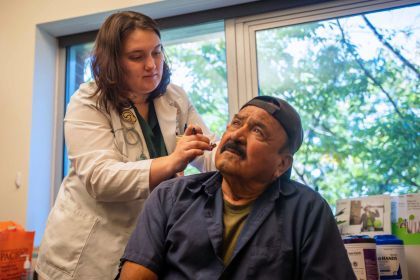Breadcrumb
Pacific accelerated music therapy program is first in nation

Music therapy major Gabby Campitelli ’25
University of the Pacific’s music therapy program is the first in the nation to establish an accredited bachelor’s degree that prepares students to enter the work force after four years rather than the five required at other universities.
For decades, music therapy majors in the United States have been required to take at least 10 semesters over five years, closing with a two-term internship that includes 900 hours of learning, service and training.
The National Association of Schools of Music recently approved Pacific’s four-year, eight-semester degree proposal which incorporates the internship during their four years.
Pacific’s music therapy program—celebrating its 85th anniversary last year—is one of the first to offer the field in American higher education.
“Michigan State, Alverno, Pacific and the University of Kansas were among the first to establish programs in the early years,” said Peter Witte, dean of the Conservatory of Music. “The new structure will serve students and help graduates enter the job market earlier. This is another significant first for Pacific.”
Music therapy is an established health profession in which music is used to address physical, emotional, cognitive and social needs of individuals, according to the American Music Therapy Association.
The change allows students in Pacific’s music therapy program to save time and money. Previously, they could not qualify for financial aid for the fifth year.
“The institution is commended for its thorough and meticulous application and its efforts on behalf of students to reduce the number of required semesters for this degree program,” wrote the Commission on Accreditation of the National Association of Schools of Music.
Gabby Campitelli ’25 has completed her courses and is working to complete the required internship in the San Luis Obispo area.
“The timing did not work out for me to use the new four-year program, but this is positive overall for Pacific,” she said. “I am very pleased they are doing this. It is outstanding for Pacific to be the only school in the country with a four-year program. This will solve many challenges for students going forward.”
Eric Waldon and Fei-Lin Hsiao, the tenured faculty members of the Pacific music therapy program, led the effort in collaboration with other faculty members. Their proposal was three years in the making before it was approved.
“This is a significant step forward for our program,” Waldon said. “While the program will be one year shorter, we have structured the classes so that students will not be missing out on crucial curriculum and music opportunities.”
Added Hsiao: “The most important thing in this effort is to support our students. We are creating many opportunities for them in an improved time frame.”
The music therapy program takes considerable dedication from its students, many of whom must learn to play piano, guitar, percussion and vocals so they can serve clients with well-rounded therapeutic care. Many students also are working on practice majors for their primary instruments.
Witte said it’s likely that Pacific’s new format will serve as an exemplar for other universities considering these new options. There are more than 90 music therapy institutions in the United States accredited by the American Music Therapy Association and National Association of Schools of Music.





